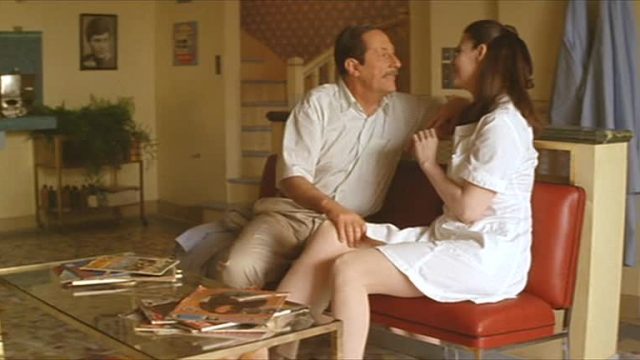On paper, The Hairdresser’s Husband (Le Mari de La Coiffeuse) is so simple it shouldn’t work as a film: a boy becomes extremely attracted to a local hairdresser, grows up, and marries another hairdresser. There’s almost no conflict through most of the film. But Patrice Leconte’s movie works because it doesn’t necessarily exist in our world. It almost feels like a fairy tale, set in a world where a man proposes marriage to a (much younger) woman right after meeting her, and she says yes.
It’s a sort of fairytale, and in some unfortunate ways a pretty old-fashioned one: there’s one reference to a character who is “homosexual, and he hated doing women’s hair”; another character says “crosswords are like women, the harder to get, the sweeter they are.” The whole thing is incredibly French, especially how the eroticism seems to emanate from characters and situations. The male gaze is strong and explicit: Leconte’s camera lingers on women’s legs, breasts, curves. The protagonist compares Mathilde, the hairdresser, to “a conquered fortress; I’d make her mine forever.” It might not be the most progressive movie these days.
And yet I can’t help loving this film. There is something incredibly erotic about going to a hairdresser and having someone massage your hair with shampoo and water before cutting it. And Leconte is smart enough to let us know that Antoine, the husband of the title, isn’t a creep — he’s still an impressionable boy, hypnotised by his first sexual memory (but not dangerously obsessed). And when destiny gives him the chance to have a happy life inside this memory, why wouldn’t he?
The Hairdresser’s Husband is a very short film (less than 80 minutes!), and most of it alternates between two modes: the contemplative and the comic, the latter provided by the amusing clients of Mathilde’s hair salon (including one on her own wedding day). The soundtrack also oscillates between Michael Nyman’s typical luxurious score and effervescent Arabian songs, exploding with unexpected energy. To see Antoine dance to these songs is to see one of the happiest men in movie history.
As Antoine, Jean Rochefort creates an incredible mix of firmness, passion, and melancholy. His eyes say more than dozens pages of dialogue. The delicate balance of the film — almost perilous, sometimes close to derailing — is only possible because of his masterful performance and his chemistry with Anna Galiena. They make us visitors in their universe, much like everyone else in the movie. It’s their world, all the other characters are just passing by. They don’t matter much to Mathilde and Antoine, because they have each other. It’s lovely until it’s not, and then it’s devastating.


